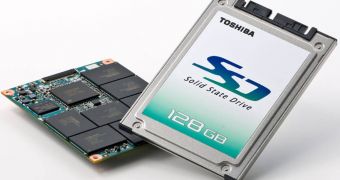Despite the fact that solid-state drives are mostly purchased by a small niche of customers, Toshiba plans to boost its presence on the NAND-based storage market until 2010. The news was broken by the company's president and CEO, Atsutoshi Nishida, during a corporate strategy meeting.
"We aim to win at least a 50% market share for SSDs used in notebook PCs in 2010 or 2011," Nishida said at the meeting for the fiscal year 2008, held in Tokio. Although NAND flash-based storage drives are still expensive, given the fact that single-level cell NAND chips haven't dropped much in pricing, Toshiba estimates that the HDD successors will equip 10 percent of the worldwide notebook shipments.
Toshiba plans to increase its presence on the SSD market and, with this in mind, organized a company-wide project team working on the development of the multi-level cell NAND memory. MLC is dramatically cheaper than its single-level cell sibling, yet it is less reliable and has a limited lifespan. While SLC memory is guaranteed for about one million read/write cycles, MLC NAND flash is rated at about 100,000 read/write cycles.
According to Nishida, the specialists involved with the development of MLC have been brought from Toshiba's semiconductor departments, as well as from the company's personal computer and HDD departments. Project leaders and researchers have also been pulled from R&D departments across the company.
"I asked the related sections of the HDD business that might compete against SSD technology for their support and gained it," Nishida said. "I told them that unless they provided their expertise and complete cooperation, the company would not make any further investment in HDD technology," he continued.
Nishida also claims that Toshiba is a major industry player, and few of its competitors can keep up with the technological advances baked in its research laboratories, especially in the NAND flash memory division. Research for MLC NAND is extremely complicated and requires increased physical and financial resources that can only be provided by a powerful enterprise.

 14 DAY TRIAL //
14 DAY TRIAL //